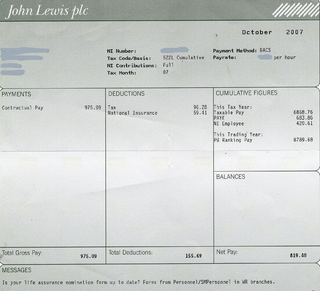 W
WCitizen's dividend is a proposed policy based upon the Georgist principle that the natural world is the common property of all people. It is proposed that all citizens receive regular payments (dividends) from revenue raised by leasing or taxing the monopoly of valuable land and other natural resources.
 W
WThe Financial Services Compensation Scheme (FSCS) is the UK's statutory deposit insurance and investors compensation scheme for customers of authorised financial services firms. This means that FSCS can pay compensation if a firm is unable, or likely to be unable, to pay claims against it. The FSCS is an operationally independent body, set up under the Financial Services and Markets Act 2000 (FSMA), and funded by a levy on authorised financial services firms. The scheme rules of the FSCS are made by the Financial Conduct Authority (FCA) and are contained in the FCA's Handbook. The FCA also appoint its Board and the FSCS is ultimately accountable to the FCA. The scheme covers deposits, insurance policies, insurance brokering, investments, mortgages and mortgage arrangement.
 W
WEx parte H.V. McKay, commonly referred to as the Harvester case, is a landmark Australian labour law decision of the Commonwealth Court of Conciliation and Arbitration. The case arose under the Excise Tariff Act 1906 which imposed an excise duty on goods manufactured in Australia, £6 in the case of a stripper harvester, however if a manufacturer paid "fair and reasonable" wages to its employees, it was be excused from paying the excise duty. The Court therefore had to consider what was a "fair and reasonable" wage for the purpose of the act.
 W
WIn economics, a negative income tax (NIT) is a system which reverses the direction in which tax is paid for incomes below a certain level; in other words, earners above that level pay money to the state while earners below it receive money, as shown by the blue arrows in the diagram. NIT was proposed by Juliet Rhys-Williams while working on the Beveridge Report in the early 1940s and popularized by Milton Friedman in the 1960s as a system in which the state makes payments to the poor when their income falls below a threshold, while taxing them on income above that threshold. Together with Friedman, supporters of NIT also included James Tobin, Joseph A. Pechman, and Peter M. Mieszkowski, and even then-President Richard Nixon, who suggested implementation of modified NIT in his Family Assistance Plan. After the increase in popularity of NIT, an experiment sponsored by the US government was conducted between 1968 and 1982 on effects of NIT on labour supply, income, and substitution effects.
 W
WPay-for-Performance is a method of employee motivation meant to improve performance in the United States federal government by offering incentives such as salary increases, bonuses, and benefits. It is a similar concept to Merit Pay for public teachers and it follows basic models from Performance-related Pay in the private sector. According to recent studies, however, there are key differences in how pay-for-performance models influence federal employees in public service roles. James Perry is one scholar who has conducted such studies. His research reveals that public servants tend to be more intrinsically motivated, and thus, are prone to have a negative reaction to monetary incentives. There is still debate, however, on what exactly makes the public sector different.
 W
WA payroll is the list of employees of some company that is entitled to receive payments as well as other work benefits and the amounts that each should receive. Along with the amounts that each employee should receive for time worked or tasks performed, payroll can also refer to a company's records of payments that were previously made to employees, including salaries and wages, bonuses, and withheld taxes, or the company's department that deals with compensation. A company may handle all aspects of the payroll process in-house or can outsource aspects to a payroll processing company.
 W
WA retainer agreement is a work-for-hire contract. It falls between a one-off contract and permanent employment, which may be full-time or part-time. Its distinguishing feature is that the client or customer pays in advance for professional work to be specified later. The purpose of a retainer fee is to ensure that the employed reserves time for the client in the future when their services are needed.